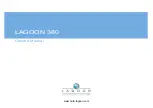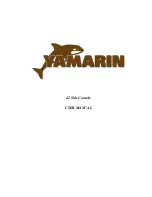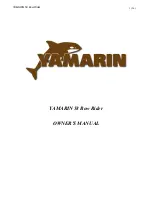
Cobalt_OM_preprint_shell.fm Page 2 Wednesday, March 1, 2006 5:39 AM
1
-
4
46 Owner’s Manual
COBALT
46
Y
ACHT
S
ECTION
1
INTRODUCTION
This manual was created following International
Organization for Standards (ISO) 10240:2004 as a
guideline. Not all information to conform to the
standards set forth by ISO can be included in this
manual without certain manufacturer’s consent of
the equipment included on your boat.
This owner’s manual contains information that is
necessary to run the boat properly, safety topics,
and operation and maintenance hints.
Even if everything has been planned and designed
for the safety of the boat and its users, boating is
highly dependent on the weather conditions, the
sea state, and the experience and physical shape
of the crew, and one can never ensure full safety. It
is your responsibility as the owner or user to know
the boat’s equipment, its capabilities and the boat’s
intended use.
The specific information on the operation of the
equipment and systems your boat is supplied with
or fitted with should be supplied by that
manufacturer. Read, understand and keep all the
information supplied, and familiarize yourself and
all users with the boat before you put it into use.
All persons should wear a suitable life
preserver/personal flotation device when on deck.
In some countries it is a legal requirement to wear a
suitable life preserver/personal flotation device that
complies with those countries’ regulations at all
times.
Intended Use
Your Cobalt yacht is intended for use as a pleasure
craft.
Craft Design Category
Significant Wave Height – is the mean height of the
highest one-third of the waves, which
approximately corresponds to the wave height
estimated by an experienced observer. Some
waves will be double this height.
OCEAN – Category A
Craft designed to operate in winds that may exceed
wind Beaufort force 8 and in significant wave
heights of 13' 1.44" (4 m) and above, and is largely
self-sufficient. Abnormal conditions such as
hurricanes are excluded. Such conditions may be
encountered on extended voyages, for example
across oceans, or inshore when unsheltered from
the wind and waves for several hundred nautical
miles.
A
WARNING
Avoid serious injury or death.
• Children, disabled people and
non-swimmers should wear a personal
flotation device at all times. Children
and non-swimmers need special
instruction in the use of life
preservers. Inform all passengers on
the proper use of personal flotation
devices and of the location of safety
equipment, man overboard recovery
equipment and the location and
deployment of the ladder.
• Avoid contact with any running
machinery moving parts, such as an
engine, generator or propeller. Contact
can result in loss of body parts,
strangulation, burns and/or severe
loss of blood. Keep all machinery
guards in place when machinery is
operating.













































